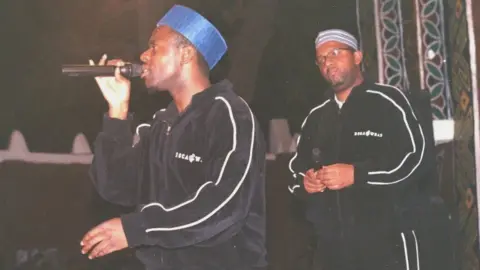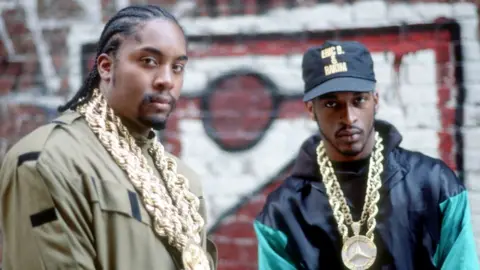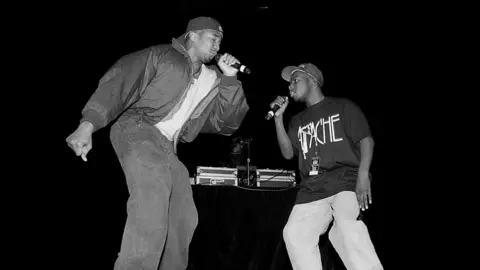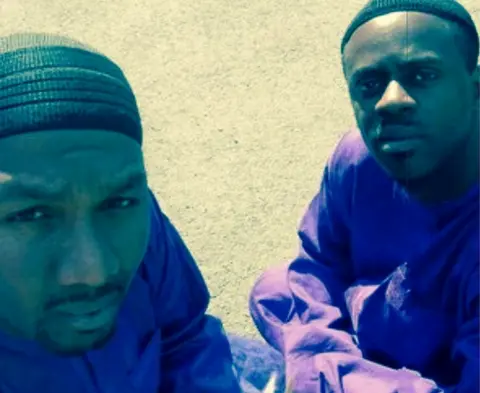'How hip-hop led me to convert to Islam'
 Ismael Lea South
Ismael Lea SouthWhile many people will tell you about music which moves them, for Ismael Lea South it fundamentally changed his way of life.
Born in Willesden, north-west London, in May 1973, the youth work consultant was introduced to hip-hop music from a young age while studying at South Kilburn High School.
"Our school had a large African and Afro-Caribbean heritage. We used to listen to people like Big Daddy Kane, A Tribe Called Quest, Public Enemy, Eric B & Rakim," he tells BBC Radio 4's Sunday programme.
 Getty Images
Getty ImagesWhile he admits initially he would simply be "nodding your head to the beat", Ismael soon began noticing more about what his favourite artists were saying.
"This was a time when a lot of the rappers were using Arabic phrases, and they weren't necessarily Muslims, so they would say things like 'Inshallah' [meaning God-willing]."
He also started paying more attention to acts who had greater depth to their music.
"There would be some rappers who would rap about how they started looking at life a bit deeper and they'd rap about spirituality," Ismael explains.
Allow Google YouTube content?
An example he gives is 1987's hip-hop classic Paid In Full by Eric B & Rakim, in which Rakim "was saying he used to be a bit of a naughty boy but then he learned that was not the way to live and now he wants to get a nine-to-five".
"I used to think 'what made him change from being like that to be getting a nine-to-five' and he used to mention Islamic phrases, so that caused me to think," he says.
The next big moment for Ismael was when he was invited by a friend to visit Speaker's Corner in central London where rap group Cash Crew were performing while on tour.
"So we went to Hyde Park Corner not knowing what Hyde Park Corner was and I was fascinated. I saw Christians, Muslims, Jews, socialists, agnostics, debating each other and I thought 'oh gosh this place is brilliant'."
 Getty Images
Getty ImagesWhile there, he also met another speaker called Muhammad Khaja who would have a profound impact on his future.
"He was of the same heritage as me, Afro-Caribbean, he was dressed in Islamic African attire and, when he was speaking and debating, no-one could compete with him.
"I started to ask him about Islam, I said 'there's some things I don't really agree with Islam' and he broke down that," he says.
Six months later, Ismael had a call from his friend who suggested they visit a mosque. While there, he again came across Muhammad Khaja.
"He said, 'Hi there, do you remember me? I want to speak to you more about Islam', and then from there I started to learn and study."
While initially being sceptical about becoming a Muslim, "as I want to have some fun while I'm young", he eventually decided he was ready to convert.
"And that's how I embraced Islam."
 Ismael Lee South
Ismael Lee SouthBut while hip-hop had helped him become a Muslim, it would still take a while for his family, who were Christians, to accept this new life.
"When I embraced Islam I stopped drinking, I stopped eating pork, I stopped going out partying - my family thought I was going crazy," he says.
"But when I told my mum I want to settle down and get married, when my mum heard that she said, 'oh, OK'.
"That kind of won her over."

- Listen to the full interview on Radio 4's Sunday programme: Same Sex Marriage and the Church of England

Follow BBC London on Facebook, Twitter and Instagram. Send your story ideas to [email protected]
